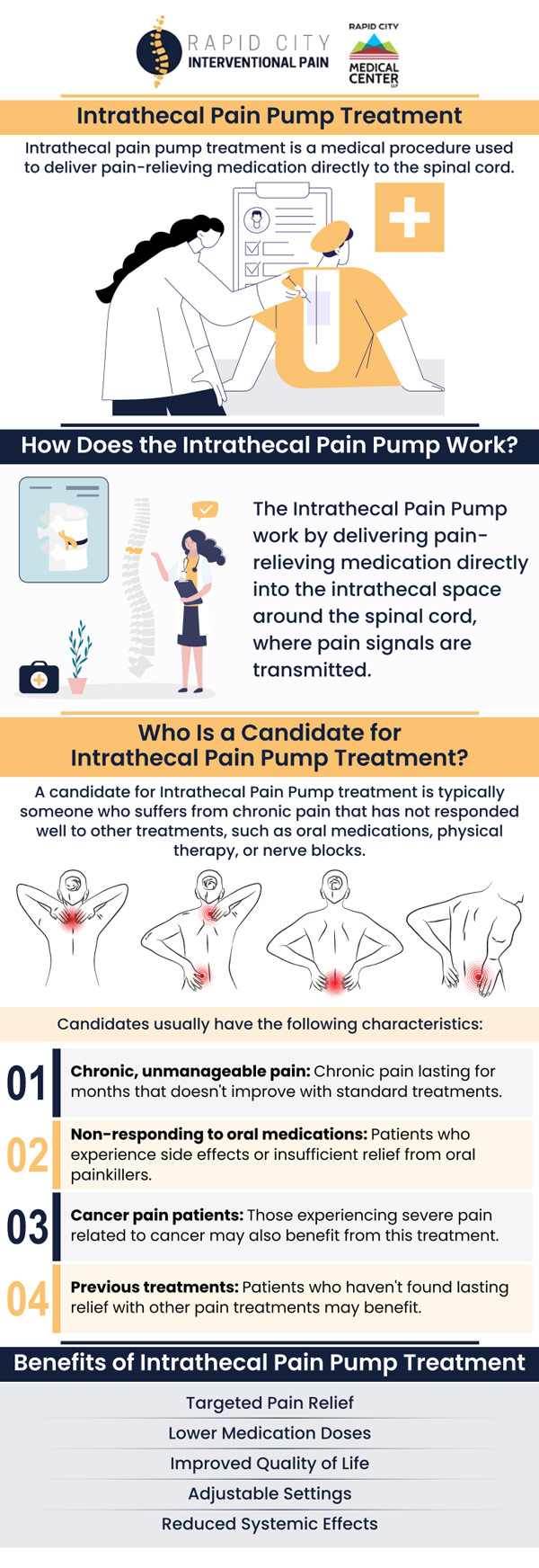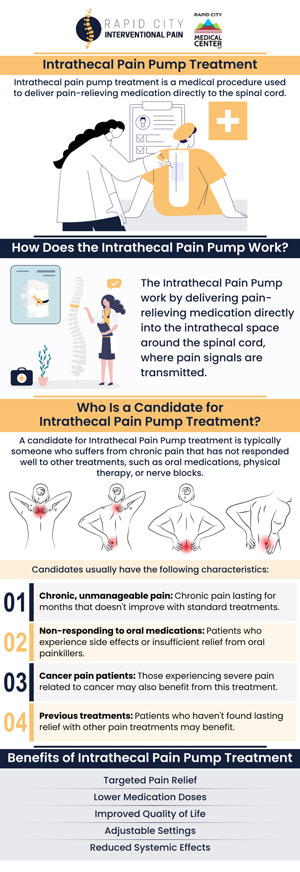Intrathecal Pain Pump Treatment Specialist in Rapid City, SD
Implanting an intrathecal pain pump may help reduce pain associated with cancer or other chronic illnesses. Medicines are administered via a tiny, flexible tube. The tube fills the space surrounding the spinal cord. The medicine gets to the nerves through the spine. It assists in preventing the brain from receiving pain signals from nerves. Dr. Lance Doeden, MD, and Dr. Tyler Ptacek at Rapid City Interventional Pain Management Clinic offer intrathecal pain pump treatment. For more information, contact us to book an appointment. We are conveniently located at 101 E Minnesota St. Suite 301 Rapid City, SD 57701.




Intrathecal Pain Pump
Many medications for pain management are given by injection or taken by mouth. Some disadvantages can result from this: the medication must travel through the entire bloodstream before there being any pain relief for the nerves in your body and brain. For many patients, this causes side effects that can last for quite some time including drowsiness, confusion, nausea, constipation, and respiratory depression. As time continues to pass, the body may become used to the medication, requiring much higher doses to treat this pain.
Pain pumps are implanted under the skin and deliver medication directly into the fluid surrounding the spinal cord. Medication is delivered using the pump, which delivers lower doses than if taken by mouth.
Pain Pump Trials
There is a two-step process before implanting a pain pump. The first is a neuropsychological evaluation that is done with a counselor. The second is an injection of medicine into the spinal fluid surrounding the spinal cord, we then assess for side effects and pain control of the medicine. Patients then come in the following day and have a discussion with the doctor about the pain relief and if they would like to move forward with an implant or a pain pump.
Pain Pump Implants
Before having this procedure, be sure to confirm your insurance coverage along with the surgery center or hospital where the procedure will be done.
Be sure to have a discussion with your doctor about the medication you’re taking regularly, as well as any medicine you might be allergic to.
Arrange to have someone accompany you to the surgery center or the hospital depending on where you have the surgery done, make sure they can drive you afterward as well. Having a family member or friend assist you in your home the following the procedure for a couple of days would help as well.
Before your surgery, your doctor will discuss with you whether your abdomen or your lower back is the best position to place your pump.
Sedation will be administered comfortably and monitored by an anesthesiologist during the surgery. The physician will either make an incision in the skin of your back or in your abdomen to place the pump. Then, a second incision will be made in your back to allow the catheter to be placed near the spinal cord.
The doctor will then carefully place and connect the other end of the catheter to the pump stem tip where it will be utilized for medication therapy, making the entire system internal and fully implanted. Once the pump and catheter have been placed in their positions, the doctor will suture both pockets up and confirm the procedure has been completed.
Patients will have a 3-day and 10-day follow-up with the doctor to confirm incisions are healthy and medication therapy is smoothly running. In general, your doctor will recommend avoiding activities such as bending, lifting, and twisting until healing is fully or almost fully complete.
Over some time, tenderness around the pump and catheter incisions will subside, and you will begin to notice less of the system itself. Once healed, the surgical sites need no special care, and you will be able to make more of a schedule for your refills. For more information, contact us to book an appointment, We are conveniently located at 101 E Minnesota St. Suite 301 Rapid City, SD 57701. We serve patients from Rapid City SD, Rapid Valley SD, Black Hawk SD, Box Elder SD, Sturgis SD, and surrounding areas.

Additional Services You May Need
▸ Back Pain Treatment
▸ Neck Pain Treatment
▸ Joint Pain Treatment
▸ Nerve Pain Treatment
▸ Degenerative Disc Disease
▸ Arthritis Pain Treatment
▸ Diabetic Neuropathy Treatment
▸ Headaches Treatment
▸ Shoulder Pain Treatment
▸ Hip Pain Treatment
▸ Spinal Cord Stimulator
▸ Complex regional pain
▸ Knee Pain Treatment
▸ Sciatica Pain Treatment

Additional Services You May Need
▸ Back Pain Treatment
▸ Neck Pain Treatment
▸ Joint Pain Treatment
▸ Nerve Pain Treatment
▸ Degenerative Disc Disease
▸ Arthritis Pain Treatment
▸ Diabetic Neuropathy Treatment
▸ Headaches Treatment
▸ Shoulder Pain Treatment
▸ Hip Pain Treatment
▸ Spinal Cord Stimulator
▸ Complex regional pain
▸ Knee Pain Treatment
▸ Sciatica Pain Treatment



